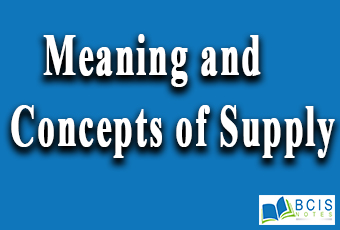
Meaning and Concepts of Supply:
Supply is a fundamental economic concept that describes the total amount of a specific good or service that is available to consumers. It can relate to the amount available at a specific price or the amount available at a specific price or the amount available across a range of prices if displayed on a graph.
Supply is as relevant to business as gravitational force is to the earth. A fundamental economic theory, supply refers to the number of goods a producer is willing and able to sell at a specific price. A firm’s profitability depends upon its ability to price goods at the market-clearing price- -the price at which demand equals supply.
• Supply comes from the behavior of sellers.
• It is the quantity supplied of any goods in the amount that the sellers are willing and able to sell.
Determinants of Supply
i. Prices of the Product: Fall in input prices make production more profitable of each output price. So, firm supply to a larger quantity at each price. In other words, the higher the price higher the supply and lower the price lower will be the supply. Therefore there is a direct and positive relationship between supply and price.
ii. Price of Related Goods: Change in the price of related goods can also change the volume of supply for a product. A decline in the price of wheat causes the farmer to produce and offer more wheat at each possible price.
iii. Technology: It determines how much inputs are required to produce a unit of output. A cost-saving technological improvement has the same effect as of fall in input prices.
iv. Number of Sellers: Increase in the number of sellers increases the quantity supplied at each price.
v. The expectation of Future: Firms may expect the price to rise in the future so they may reduce supply now, to sell goods at a high price in the future.
vi. Taxes and Subsidies: The imposition of heavy taxes on inputs leads to an increase in the cost of production and consequently supply is reduced. Similarly, heavy taxes on manufactured articles raise the price of the product which will generally lead to a decrease in the supply. Similarly, subsidies lower the costs and increase the supply.
vii. Natural Factors: Favorable natural factors help to boost up the production while unfavorable ones hinder it and the supply is adversely affected.
Types of Supply
Supply is of two types:
1. Joint supply: It refers to the goods supplied or produced jointly. Examples of joint supply are wheat and straw, wool and mutton.
2. Composite Supply: When there are different sources of supply of a commodity or service, we say that the supply is composed of all these resources. Whenever there is a substitute or rival sources of supply, the supply is composite.
You may also like: Law of Demand

Leave a Reply